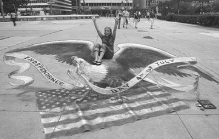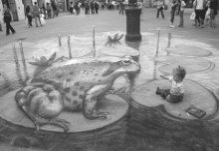题目内容
An idea to cycle to Tibet ____1.__(occur) to me one year ago. I know___2.___ idea is quite practical in economical way. For one thing, I can’t have too much money. For another, it is bound to do me good because I can take in fresh air___3.___ the way there. I called Tom, ___4.___ had borrowed me a sum of money, telling him my idea. He was excited at my words and promised to pay off his debt as soon as possible. He also offered to team up with me. ___5.___ (apparent), he also showed great interest in this trip. Five months____6.___ our trip, we kept taking exercise and built up strong body because we knew_7.____ would be impossible to realize our dream without being ___8.___ (health). I used to hear that some people__9.___(make) a trip there died from the lack of oxygen---- they did devote their lives to their dream ! But the cost is too much. So ___10.___ of us insisted on running in the morning from time to time.
1.occurred
2.the
3.on
4.who
5.Apparently
6.before
7.it
8.healthy
9.making
10.both
【解析】
试题分析:
1. one year ago.,可知是发生在过去的事情,故用一般过去时。
2.
3. the way是固定用法,意思是在路上。
4.
5.】考查副词:位于句首,且与句子有逗号隔开,修饰整个句子,故用副词。
6.】考查介词:句意,在我们旅行之前的五个月,所以填before。
7.】考查形式主语: 这里含有一个省略了that的宾语从句。在宾语从句中,不定式是真正的主语,形式主语只能用it。
8.】考查形容词:be动词后用形容词。
9.】考查动名词:作句子主语,故用v-ing形式。
10.】考查代词:表示两者都,故用both。
考点:考查语法填空

Below are some interesting columns from a website:
Girl’s Crazy Historical Costumes Stella Ehrhart, a US third-grader, dresses up as a different historical figure every day before school—yes, you heard right! The 8-year-old has been coming to class in a different persona (人物) daily since the second day of second grade, when she showed up as American author Laura Ingalls Wilder. Stella gets ideas for what to wear from the book 100 Most Important Women of the 20th Century. However, in the past years she has also dressed up as fictional characters including Hermione Granger from Harry Potter. The eager student managed to get through the entire second grade without repeating herself, but now she is running out of ideas. The girl’s parents, who are both theater professionals, say they support their daughter’s “creativity”. Her mother told UK news website The Huffington Post, “She goes into her closet and just picks out what she wants each day.” Learning Soars How do you get a child’s early education off the ground? A head teacher in the Georgian city of Rustavi has found a unique way of creating an exciting learning environment. He has transformed a plane into a kindergarten. Gari Chapidze bought an old but functional Yakovlev Yak-42 from Georgian Airways and filled it with education equipment, games and toys, but left the cockpit (驾驶舱) untouched so it could be used as a play area. “The idea was to create a kindergarten where children go | with joy,” Chapidze, who runs the kindergarten, told AFP. “The children come in to the kindergarten with pleasure and cry when they have to go home. They are happy here,” he added. Taxi Driver Gets Lucky in Las Vegas Bright lights and big wins—this is what Las Vegas is known for, and even the taxi drivers here get lucky. Well, at least recently one did. Adam Woldemarim, 42, discovered $ 221,510 in the back of his van after a long day at work. The money was in a laptop case left between the seats of the Virgin Valley cab. What did Woldemarim do with the cash? He turned it in. The Ethiopian driver soon got a call from the case’s owner who, according to the Las Vegas Review-Journal, had “won big” and was on his way to the airport when he realized he had forgotten his winnings. Woldemarim was given a $ 2,000 reward. But it was reported that the driver’s fellow taxi drivers thought he should have got a lot more. Eat Crickets (蟋蟀) and Worms at a Museum The Academy of Natural Sciences in Philadelphia is putting on a night for meat eaters who want to try some unusual foods. It is hosting a cocktail party on Oct 27 called Cuisine from the Collections. The food on the menu is inspired by the exhibited specimen (标本) at the museum. The event is for adults only. Let’s hope they don’t get a stomach bug from all the insects! |
1.Stella Ehrhart gets ideas on how to dress up every day before school from ________.
A. Laura Ingalls Wilder B. a book
C. Hermione Granger D. her parents
2.Which of the following is the biggest problem Stella Ehrhart is facing?
A. She has to get through the entire second grade dressing up as others.
B. She finds her parents no longer offer her as much support as before.
C. She finds it hard to think of enough new figures to dress up.
D. She has difficulty dressing up without falling behind in study.
3.Yakovlev Yak-42 is a certain kind of ________.
A. school B. company C. toy D. plane
4.According to the passage, the van driver ________.
A. was lucky to win a laptop case after a long day at work
B. was on his way to the airport when he saw the money
C. was given a reward but not quite satisfied with the sum
D. discovered the money but didn’t keep it for himself


